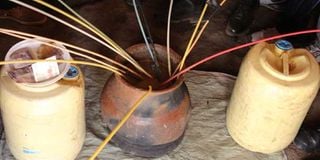
Traditional brews made from grains such as maize (busaa) and sorghum.
Kenyan brewers could soon be able to sell traditional alcoholic drinks such as mnazi, busaa and muratina without a requirement for a licence, should a new Bill before Parliament be passed into law.
The development is contained in a legislative proposal before the Senate by nominated Senator Raphael Chimera.
The Bill – Alcoholic Drinks Control (Amendment) Bill, 2024 – seeks to remove the requirement of licensing for traditional alcoholic drinks by amending the principal law, Alcoholic Drinks Control Act, 2010.
According to Senator Chimera, traditional brews hold cultural significance in various communities where they have been prepared since time immemorial for traditional rites.
The ceremonies include dowry, circumcision, initiation into the council of elders, reconciliation of family members, praying for rain, blessing of children and land.
Therefore, he argues, regulating the sale of such brews is discriminatory as the brews form the heart of the cultural fabric of the community’s traditions.
Also Read: Local brews can end illicit liquors
“The importance of traditional alcoholic drinks in day-to-day functions and celebrations of the Kenyan communities cannot be over emphasised,” he said.
In the Bill, Mr Chimera wants traditional alcoholic drinks legally recognised to mean a beverage produced using locally available ingredients and indigenous methods
To achieve that, he wants section 7(1) of the principal Act which states that no person shall— (a) manufacture or otherwise produce; (b) sell, dispose of, or deal with; (c) import or cause to be imported; or (d) export or cause to be exported, any alcoholic drink except under and in accordance with a licence amended.
The amendment will see the words “except under and in accordance with a licence issued under this Act” deleted and substituted with “without a licence issued under this Act”, unless it is a traditional alcoholic drink.
The proposals also include amendments to ensure the packaging of alcoholic drinks is in quantities of not less than 750 millilitres. Currently, the permissible minimum alcohol packaging is in quantities of 250ml.
The proposal will see Section 31(2)(a) which states that no person shall manufacture, pack, distribute or sell an alcoholic drink in a container of less than 250 mililitres amended to increase the packaging quantity.
“The Principal Act is amended in section 31(2)(a) by deleting the numeric value 250ml appearing immediately after the words “of less than” and substituting therefore with 750ml,” said Mr Chimera.









